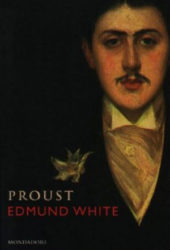 Marcel Proust
Marcel Proust
by Edmund White
Published by Viking Adult
Published January 1, 1999
History (biography)
165 pgs. • Find on Amazon.com
Reviewed by Stephen O. Murray
December 13, 2000
The Penguin Lives series got off to an auspicious start with Edmund White’s 1999 insightful exploration of the mystery of Marcel Proust, the neurotic dandy and social-climber who wrote the greatest novel of the twentieth century A la recherche du temps perdu, long known in English as Remembrance of Things Past but now titled more literally In Search of Lost Time.[1]The wonderful title Scott Moncrieff, the initial translator into English, supplied for Albertine disparue, The Sweet Cheat Gone, has also been disenchanted into The Fugitive.
After failing many times to penetrate Swann’s Way, when I had the necessary experience (of heartbreak), I was enraptured by Proust’s vast novel and have even read his abandoned earlier attempt, Jean Santeuil. I have close to a shelf of books about Proust and would seem to be a candidate for a large-scale biography rather than a brief life. However, I have never been able to tolerate George D. Painter’s unfortunately influential and much overvalued two-volume biography (originally published in 1959 and 1965) or to surrender to the 950+ pages of the leading French Proust scholar’s pile of raw data (the biography by Jean-Yves Tadié recently published in English).
I think that I know quite a bit about À la recherche du temps perdu, and some things about Proust, but was enlightened as well as entertained by White’s account of the pathologies and achievements. Having written much autobiographical fiction as well as the major biography of Jean Genet (another great and warped French writer), White is a particularly auspicious choice of explicator. He knows from the inside that “every autobiographical novel inevitably mixes harsh truths about its first-person hero with a bit of wish fulfillment.”
I think that White has considerable experience of being the one who loves. Like Proust, many of his beloveds have been men who are predominantly heterosexual and have consciousnesses less developed than the writer-connoisseur’s. White also knows from personal experience how warping having to hide one’s homosexuality can be.
Although White surprisingly uses the anachronistic “gay” for someone who was not “out of the closet,” even if everyone knew his sexual predilections, he also understands and explains the impossibility of being openly gay in the France of a century ago. Painter’s pathetic attempts to the contrary notwithstanding, other than his mother and grandmother (and in a non-erotic sense, his maid), those Proust loved and/or desired were males. Early on, his beloveds were his peers in age, education, class—and (generally) sexual orientation. His excessive demands drove all of them away, and, later on, his beloveds were uneducated, younger, working-class, heterosexual males who exploited his lavish generosity (and probably did not “put out”) but also fled his (nonsexual) demands.
I doubt that Proust really wanted requited or reciprocated love, or any equality with a partner (a sexual or any other kind). He sought and appreciated the attention of friends, whom he combined into Robert St. Loup in his novel. Without being indulged by his parents, physically and emotionally sick, and left with a large inheritance (equivalent to $6 million now), he would not have been who he was or been able to accomplish what he did. The pathologies, especially epic jealousy, are inextricable from his accomplishment in (mostly) objectifying them and dissecting French aristocratic society of a century ago. Similarly, without the interruption of publishing caused by the First World War, a quite different book would have emerged.
White makes sense of this and much more in a hundred and fifty lucidly and beautifully written pages. Like Proust himself, White seizes on enchanting details pointing to general truths rather than piling up details (as other biographers, Tadié in particular, do). Appended is nine pages of bibliographic discussion that should not be missed (even though I think him overgenerous to both Painter and Tadié).
As much as I like Samuel Beckett’s also very brief book on Proust’s masterpiece, I am certain that White’s brief biography is the best introduction to Proust. I think Alain de Botton’s daring and delightful How Proust Can Change Your Life is more savory after reading In Search of Lost Time than before, though I highly recommend it as well.
Postscript
I was especially struck by White’s contrast of Proust to André Gide (even though it does not seem to me that Gide, especially in his parables, proceeded like this; perhaps in The Counterfeiters, a book with considerable jealousy represented…):
Proust rejected André Gide’s more ordinary form of realism, his method of building up a character or situation through the accretion of small details, by saying that he, Proust, could be interested only in those details that pointed toward a general truth or that expressed poetic enchantment. (34)
Published by epinions 13 December 2000
©2000, 2016, Stephen O. Murray

